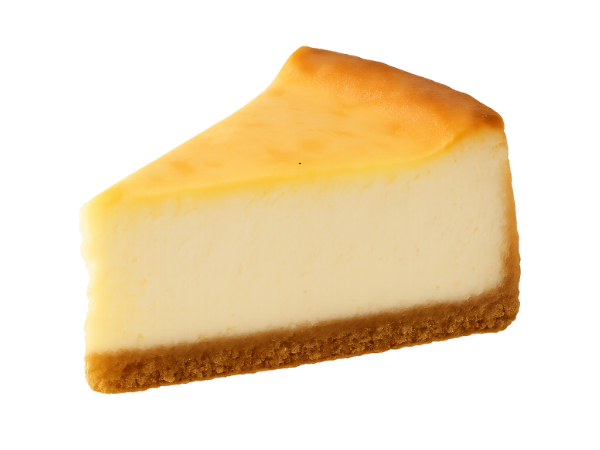
Cheesecake
Caffeine
5–40 mg
Note: Plain cheesecake contains no caffeine. However, flavored varieties such as chocolate, mocha, espresso, or matcha cheesecakes can contain small amounts of caffeine depending on the recipe and portion size.
| Attribute | Value |
|---|---|
| Caffeine Level | Very Low |
| Serving Size (slice) | 80 g |
| Caffeine | 5–40 mg (per slice) |
| Caffeine per 100 g | 10–50 mg |
| Calories | 250–320 kcal |
| Sugar | 20 g |
Cheesecake is one of the world’s most beloved desserts, known for its creamy texture and rich flavor. While most cheesecakes are caffeine‑free, certain variations that include chocolate, coffee, or matcha can contain small amounts of caffeine.
What Is Cheesecake?
Cheesecake is a baked or chilled dessert made primarily from cream cheese, sugar, and eggs, often layered on a crust of crushed cookies or graham crackers. Its origins trace back to ancient Greece, but today it is enjoyed worldwide in countless variations.
Defining traits of cheesecake include:
- Creamy Base – Made with cream cheese, ricotta, or mascarpone.
- Sweetener – Typically sugar, though some recipes use honey or alternatives.
- Crust – Commonly graham cracker, digestive biscuits, or pastry.
- Baking Styles – New York–style baked cheesecake vs. no‑bake chilled versions.
- Global Variations – Japanese cotton cheesecake, Italian ricotta cheesecake, and more.
Cheesecake’s versatility makes it a dessert that adapts to local tastes and ingredients, which is why it has so many regional and flavored versions.
Nutritional Facts of Cheesecake
Cheesecake is calorie‑dense due to its high fat and sugar content. A standard slice provides a significant portion of daily energy intake, making it a dessert best enjoyed in moderation.
Average nutrition per 100 g of plain cheesecake:
- Calories: 308–321 kcal
- Protein: 5.4–5.5 g
- Fat: 19–22 g (with 10 g saturated fat)
- Carbohydrates: 25 g
- Sugars: 20 g
- Fiber: 0.3 g
While cheesecake is not a “light” dessert, it does provide protein and calcium from dairy. However, the high fat and sugar content mean it should be considered an occasional treat rather than a daily indulgence.
Cheesecake Ingredients and Variations
The base ingredients of cheesecake are simple, but variations can dramatically change its flavor and nutritional profile.
Common ingredients include:
- Cream Cheese or Ricotta – Provides the creamy texture.
- Eggs – Bind the mixture and add richness.
- Sugar – Sweetens the filling.
- Crust Base – Graham crackers, cookies, or pastry.
- Flavor Additions – Vanilla, lemon zest, chocolate, coffee, or fruit.
From classic New York cheesecake to lighter Japanese versions and indulgent chocolate or mocha cheesecakes, the possibilities are endless. Each variation can slightly alter the nutritional values and, in some cases, introduce caffeine.
How Much Caffeine Is in a Slice of Cheesecake?
Plain cheesecake contains 0 mg of caffeine. However, flavored cheesecakes that include chocolate, coffee, or matcha will contain small amounts.
Caffeine in a typical slice (about 80 g):
- Plain Cheesecake: 0 mg
- Chocolate Cheesecake: 5–15 mg (depending on cocoa content)
- Mocha Cheesecake: 10–30 mg (from coffee and chocolate)
- Matcha Cheesecake: 20–40 mg (depending on green tea powder used)
For comparison, a cup of brewed coffee contains 95 mg of caffeine. This means even flavored cheesecakes have relatively low caffeine levels, though sensitive individuals may still notice the effects.
Caffeine Content per 100g of Cheesecake
When measured by weight, cheesecake’s caffeine content depends entirely on added ingredients.
Caffeine per 100 g serving:
- Plain Cheesecake: 0 mg
- Chocolate Cheesecake: 10–20 mg
- Mocha Cheesecake: 15–35 mg
- Matcha Cheesecake: 25–50 mg
This shows that while plain cheesecake is caffeine‑free, flavored versions can contain amounts similar to a small cup of tea.
Do Flavored Cheesecakes (Chocolate, Mocha, Matcha) Contain More Caffeine?
Yes — flavored cheesecakes that use chocolate, coffee, or matcha naturally contain caffeine. The exact amount depends on the recipe and portion size.
Caffeine‑containing cheesecake types:
- Chocolate Cheesecake – Cocoa solids contribute small amounts of caffeine.
- Mocha Cheesecake – Combines both coffee and chocolate, leading to higher levels.
- Matcha Cheesecake – Uses powdered green tea, which is naturally caffeinated.
- Espresso Cheesecake – Can contain the highest caffeine levels if brewed espresso is added.
These variations are still relatively low in caffeine compared to beverages, but they may matter for people who are highly sensitive or avoiding caffeine altogether.
Is Cheesecake a Healthy Dessert Choice?
Cheesecake is indulgent, rich, and satisfying — but it is not typically considered a health food. Its high calorie, fat, and sugar content make it a dessert best enjoyed occasionally.
Health considerations of cheesecake:
- Pros:
- Provides protein and calcium from dairy.
- Can be made lighter with reduced‑fat cream cheese or yogurt.
- Fruit toppings can add vitamins and antioxidants.
- Cons:
- High in saturated fat and sugar.
- Calorie‑dense, which may contribute to weight gain if eaten frequently.
- Flavored versions may add caffeine, which some individuals avoid.
In moderation, cheesecake can be part of a balanced diet. Choosing smaller portions, lighter recipes, or fruit‑based toppings can make it a more mindful indulgence.
